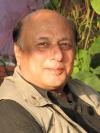Poems were written mainly in Hindi language. Dominant movement is political.
Biography
Uday Prakash (Hindi: ??? ??????) is an eminent scholar, and a prolific Hindi poet, journalist, translator and short story writer.
His writing spans fiction, non-fiction, and critically acclaimed films and documentaries. He has worked as an administrator, an editor, a researcher, and a TV director. Now a free-lance writer, he writes for many major dailies and periodicals and takes part in seminars and reading programmes.
Biography
Uday Prakash was born on New Year's Day 1952, in the "backward" village of Sitapur, Shahdol. He grew up there, "where we learnt to write the alphabet on wooden boards with reed quills". Orphaned as a teenager, he was raised by a teacher.
Prakash took his Master?s degree in Hindi Literature, receiving a Gold Medal from Saugar University in 1974. From 1975-76 he was a research student at Jawaharlal Nehru University (JNU); as a passionate communist party member he was imprisoned[8] (he later lost interest in political ideology). In 1978 he taught as an Assistant Professor at JNU, and its Imphal Center for Post Graduate Studies. In 1980 he left academia, to become Officer-on-Special-Duty with the Madhya Pradesh Department of Culture. At the same time, he was Controlling Officer of the Bhopal Rabindra Bhawan, and assistant editor of Poorvagraha, a journal of Hindi literary criticism. (He was later critical of the Hindi literary establishment including Ashok Vajpeyi, who he worked for at Poorvagraha.)
From 1982-90, Prakash worked in New Delhi newspapers; first as a subeditor of the Hindi news weekly Dinmaan, and later as Assistant Editor of the Sunday Mail. In 1987 becoming Assistant Professor at the School of Social Journalism (on deputation). In 1990 he joined ITV, (Independent Television), and became head of the PTI TV Concept and Script Department. Since 1993, he has been a full-time freelance writer (and sometime director - for instance, the Ministry of Agriculture commissioned him to research, write, and direct the 15-episode television documentary Krishi Katha on Indian agricultural history, broadcast in 1997).
Prakash was the editor of the monthly English language magazine "Eminence" (published in Bangalore) until April 2000.
Prakash won the 2010 Sahitya Akademi Award in Hindi for his collection of short stories, Mohan Das.
Published Books
Peelee Chhatri Wali Ladki (2001) is Prakash's best known, and longest continuous story. Often called a "novella", Prakash calls it "a long short story" - Cheeni Baba will be his "first novel". His 2006 novella Mohan Das has been translated into English, seven Indian languages, and adapted by the author for the "Mohandas" screenplay (2009).
Awards
1. Bharat Bhushan Agrawal Puraskar, 1980.
2. ?Om Prakash Samman? for the collection of short stories ?Dariyayi Ghoda?, in 1984.
3. ?Best author of the year? awarded by Union Bank of India in 1989.
4. ?Shrikant Verma Memorial Award? for the short stories collections Tirich, in 1990
5. ?Muktibodh Samman? : a National Award by Madhya Pradesh Sahitya Parishad for Aur Ant Mein Prathna in 1996.
6. ?Sadbhawna Samman? 1998, for the contribution in the field of journalism by the Organization of Harmony and Fraternity, New Delhi.
7. Awarded Senior Fellowship in the field of literature by the Department of Culture,Govt. of India for two years till Oct. 1999.
8. ?Sahityakaar Samman? : Hindi Akademi (Year 1999)
9. Pahal Samman, 2003. A prestigious award for contemporary literary contribution.
10. Pushkin Award, 2007.
11.Dvijdev Samman, 2008.
12. Vanmali Samman, 2008.
13. SAARC Literary Award : 2009
14. Sahitya Akademi Award, 2010 ..






